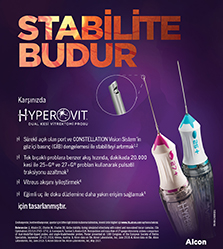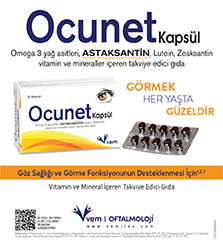2M.D., Pendik State Hospital, Eye Clinic, Istanbul/TURKEY
3M.D., Agri State Hospital, Eye Clinic, Agri/TURKEY
4M.D. Asistant, Haydarpasa Numune Training and Research Hospital, Eye Clinic, İstanbul /TURKEY Purpose: To determine the results of using Densiron-68 (a mixture of F6H8 and silicone oil) as an intraocular tamponad in the treatment of retinal detachment complicated with proliferative vitreoretinopathy (PVR).
Materials and Methods: Retrospective evaluation of 25 eyes of 25 patients (F/M:11/14) with stage C or higher PVR and inferior or total retinal detachment who underwent pars plana vitrectomy followed by injection of Densiron-68 as an intraocular tamponad. The anatomical and visual results of surgery and intraoperatif and postoperatif complications were recorded.
Results: Twenty three patients (92%) showed stable retinal reattachment after removal of silicone oil at the mean follow-up period of 12.6±1.3 months. Phtizis bulbi was seen in two (8%) cases which developed recurrent retinal detachment. Preoperative mean best corrected visual acuity improved from 1.49±0.71 to 1.22±0.65 in logarithm of the minimum angle of resolution (logMAR) postoperatively. Complications included temporary inflammatory reaction and early silicone emulsification was observed in 23 patients (92%) and 19 patients (76%), respectively. Elevated intraocular presure occured in five (20%) patients and epiretinal membran developed in seven (28%) patients. Four (50%) of eight phacic patients developed cataract and these patients underwent phacoemulsification surgery.
Conclusion: Densiron-68 is a safe intraocular tamponad in patients with retinal detachment complicated with PVR. But complications of Densiron-68, such as inflammatory reaction and emulsification, should also be considered.
Keywords : Densiron-68, proliferative vitreoretinopathy, complicated retinal detachment



